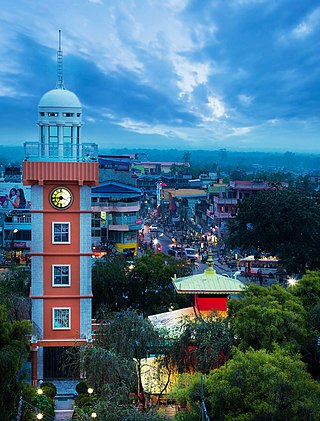
Dharan is a sub-metropolitan city in Sunsari District of Koshi Province, in eastern Nepal, which was established as a fourth municipality in the Kingdom in 1958. It is the third most populous city in eastern Nepal after Biratnagar and Itahari. The Nepali word "dharan" means a saw pit. The rainforest from which the tree trunks came is still just on the edge of the city. Much later the British Gurkha camp opened in October 1960. The use of the camp by British Gurkhas finished in the mid-1990s. Dharan has an estimated city population of 173,096 living in 34,834 households as per the 2021 Nepal census. It is one of the cities of the Greater Birat Development Area which incorporates the cities of Biratnagar-Itahari-Gothgau-Biratchowk-Dharan primarily located on the Koshi Highway in Eastern Nepal, with an estimated total urban agglomerated population of 804,300 people living in 159,332 households. It is the largest city in the Koshi Province by Area. It covers 192.32 square kilometers while Biratnagar and Itahari is 2nd and 3rd biggest cities by Area

The Kirati people, also spelled as Kirat or Kirant or Kiranti, are Sino-Tibetan ethnolinguistic groups living in the Himalayas, mostly the Eastern Himalaya extending eastward from Nepal to North East India.

Rajesh Hamal is a Nepalese, International film actor and a television host. He is a popular actor in Nepali cinema and is often called "MahaNayak" in Nepal. Hamal started his acting career in 1991 and peaked in the 1990s and early 2000s. He holds several box office records in Nepali cinema, including the most commercially successful films as a lead actor, most consecutive hits and most awards as an actor.

The Dhaka topi, or Nepali topi, is a traditional Nepali cloth hat which forms part of Nepalese national dress, and worn by men on celebrations.

Loot is a 2012 Nepali crime thriller film that was directed and written by Nischal Basnet as his debut. The film received critical acclaim with praise directed towards the performances of the cast, the screenplay, twists, climax and the direction of Nischal Basnet. The film, and especially Saugat Malla's character Haku Kale, developed a cult following in Nepali cinema. With an estimated budget of 5,000,000 to 7,000,000 Nepalese rupees (NPR), Loot grossed 52 million NPR at the box office and went on to become the highest grossing Nepali movie of all time, breaking several records at the box office. It is credited for bringing realism to Nepali cinema rather than focusing on larger than life routine masala Nepali film and brought a new wave of Cinema in Nepal. The film is also credited for reviving the box office in Nepal, attracting Nepali youth audience who at that time were attracted to Hollywood and Bollywood cinema moreso than routine Nepali cinema. The film won three National Film Awards.
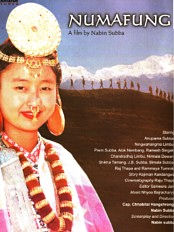
Numafung is a 2004 Nepali-language film that portrays the culture and tradition of the Limbu community. It is directed by Nabin Subba, who also wrote the screenplay. The film was screened at the Thirteenth Finnish Indigenous Film Festival. The lead characters in the movie are Anupama Subba, Niwahangma Limbu, Prem Subba, Alok Nembang and Ramesh Singhak. Numafung means a "beautiful flower" in the Limbu language. The majority of shooting took place at Panchthar, Nepal, and in Sikkim and Assam.

Goodbye Kathmandu is a Nepali movie directed by Nabin Subba. The main characters of the film are Anoop Baral, Malvika Subba, Karma and Shahana Shrestha. This movie portrays the story of struggle to migrate to live in the capital city of Nepal i.e. Kathmandu. Rajesh Gongaju is the author of the film. Theierry Taieb is the cinematographer. The film was premiered at Busan International Film Festival in 2024.
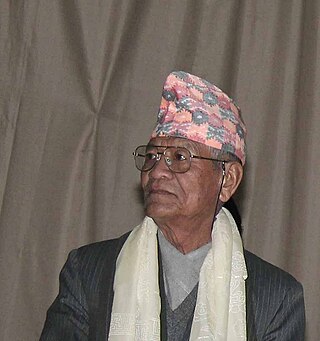
Til Bikram Nembang Limbu, professionally known as Bairagi Kainla or Bairagi Kaila, is a Nepalese poet and litterateur. He has served as Chancellor of the Nepal Academy from 2009 to 2013. Part of his significant literary struggle was the Tesro Aayam movement. During the early 1960s, he, along with Ishwor Ballav and Indra Bahadur Rai, searched unexplored realms of Nepali literature and added a new dimension – the third dimension – to Nepalese literature.

Mahaguru Phalgunanda also known as "Mahaguru Phalgunanda" or Phalgunanda Lingden (1885–1949) was a leader of the Kirat religion for the Kirat people of Nepal.
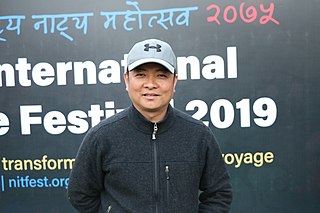
Dayahang Rai is a Nepalese actor, director, and playwright. He is one of the most popular actor of Nepal. He has starred in over 50 films and is one of the leading contemporary actors of Nepal. He has received various accolades throughout his acting career. Dayahang is a theatrical actor who made the jump to Nepali cinemas.
Alok Nembang was a Nepali film director. He was also a well-known music video director in Nepal for more than a decade.

Dinesh Subba (Limbu) (Nepali: दिनेश सुब्बा) is a composer, singer and lyricist of Nepali music.
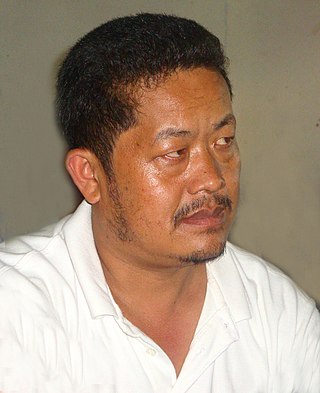
Upendra Bahadur Angdembe Limbu who is known as Upendra Subba is a Nepali poet, lyricist, writer, and film director. He is one of the initiators of the movement called Srijanshil Arajakta along with Rajan Mukarung and Hangyug Agyat.
Manoj Kumar RC, credited as Manoj RC is a Nepali film actor known for his versatile acting. He has received Kamana Film Award for Best Actor in Negative Role for his performance in Madhumas. It was a blockbuster and his role was well appreciated by the audiences. He rose to prominence from his debut historical film Bir Ganeshman portraying in the role of martyr Gangalal Shrestha in 2002. His first leading role in a film was Lakshya. He has appeared in significant music videos including Paap Punya song by Hemant Rana.

Karun Thapa born on 23 March 1965) is a Nepali IT expert, film editor, 3D animator, trainer, a well-known lyricist and Ghazal writer. Karun is known for his technological contribution to Nepali IT and media industry. He has contributed by introducing Devanagari fonts in computers, introducing AVID Digital Film Editing system in Nepal and introducing 3D animation in Nepal.

Ganesh Panday is a Nepalese filmmaker and journalist. His most recent film about earthquakes in Nepal has won 15 International Awards
"Melancholy" is an environmentally-themed song sung by 365 Nepali artists. This song was intended to promote an environmental message by breaking the Guinness World Records for "Most Vocal Solos in a Song Recording", which it successfully did. It was written, music composed and directed by environmentalist Nipesh Dhaka. The song was recorded as a single on 19 May 2016. The recording sessions were inaugurated by Prime Minister Khadga Prasad Oli at 8 am and continued until 6 pm. The song was released on 2 September 2017 by President Bidya Devi Bhandari at Army Officer's Club, Kathmandu.

The Voice of Nepal is a Nepalese reality show and the Nepalese format of the international TV singing reality series called The Voice. The show usually has four different coaches (judges), who eventually form four different teams after the selection event called the Blind Audition. Each team has to go through the battle round where contestants are paired with one another within the same team and only half of the total selected contestants from the blind audition are selected for the knockout round. During the knockout round, based on The Voice format, only the best and strongest contestants who their respective coach consider the best overall are selected by their coaches. They also have the sole right to do this on his or her own and take them to the live round. During the live round event, through a series of voting episodes, only one contestant with the most popular vote will advance to the grand finale. The first season of the voice of Nepal was won by CD Vijaya Adhikari from Team Deep, season 2 was won by Ram Limbu from Team Pramod and season 3 was won by Kiran Gajmer from Team Pramod. The Grand Finale of season 1 was held on 14 December 2018 in Quatar stadium, the second season's Grand finale was held at Taragaon Open Field Chuchchepati Kathmandu on 7 December 2019 and the third season's Grand Finale was held in The Voice Studio, Dhumbarahi. The voice of Nepal was bought by Himalaya Television.
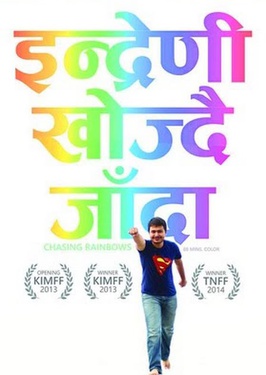
Indreni Khojdai Jada is a 2013 Nepali drama film, directed and written by Sahara Sharma in her debut. The film is produced by Abhimanyu Dixit under the banner of Gaythali Entertainment. The film stars Kritika Lamsal, Deepak Ghimire, Sanam Pyakurel, Sahayog Adhikary, and Dipendra K.C. The film generally received mixed feedback from the critics. The film premiered at the 11th edition of Kathmandu International Mountain Film Festival.

Jaari is a 2023 Nepali social drama film written and directed by Upendra Subba. The film is produced by Ram Babu Gurung under the banner of Baasuri Films. Released on April 14, 2023, the film stars Dayahang Rai, Miruna Magar, Prem Subba, Bijay Baral, Roydeep Shrestha, and Rekha Limbu. The film is based on Limbu community and their Jaari tradition, which was historically one of the most significant part of their culture; the Jaari tradition was also relevant in many other communities of Nepal.

















